Developing the bpfman-operator
This section is intended to give developer level details regarding the layout and design of the bpfman-operator. At its core the operator was implemented using the operator-sdk framework, which make those docs another good resource if anything is missed here.
High level design overview
This repository houses two main processes, the bpfman-agent and the bpfman-operator, along with CRD api definitions
for BpfProgram and *Program Objects.
The following diagram depicts how all these components work together to create a functioning operator.
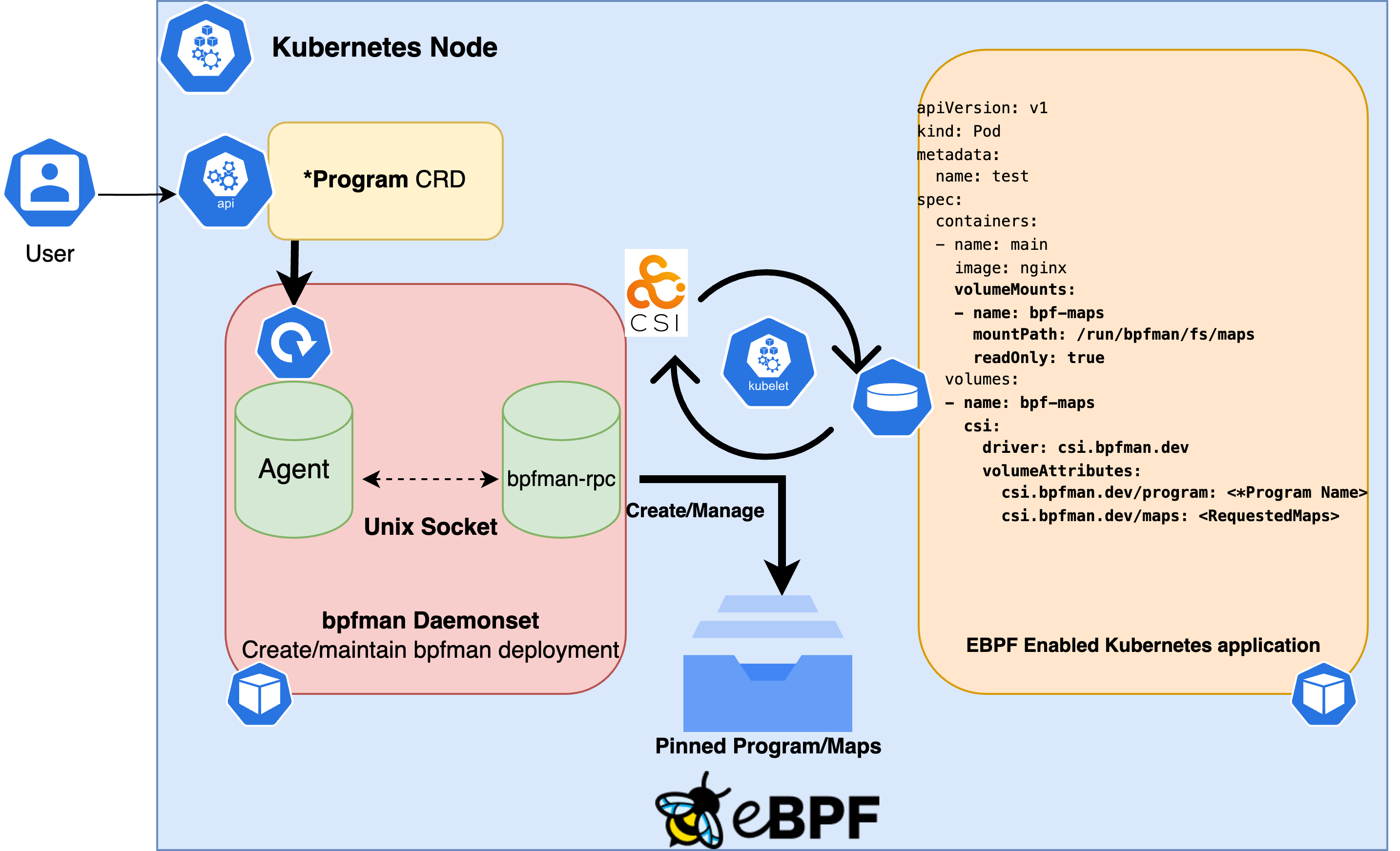
The bpfman-operator is running as a Deployment with a ReplicaSet of one.
It runs on the control plane and is composed of the containers bpfman-operator and
kube-rbac-proxy.
The operator is responsible for launching the bpfman Daemonset, which runs on every node.
The bpfman Daemonset is composed of the containers bpfman, bpfman-agent, and node-driver-registrar.
Building and Deploying
For building and deploying the bpfman-operator, simply see the attached make help
output.
$ make help
Usage:
make <target>
General
help Display this help.
Local Dependencies
kustomize Download kustomize locally if necessary.
controller-gen Download controller-gen locally if necessary.
register-gen Download register-gen locally if necessary.
informer-gen Download informer-gen locally if necessary.
lister-gen Download lister-gen locally if necessary.
client-gen Download client-gen locally if necessary.
envtest Download envtest-setup locally if necessary.
opm Download opm locally if necessary.
Development
manifests Generate WebhookConfiguration, ClusterRole and CustomResourceDefinition objects.
generate Generate ALL auto-generated code.
generate-register Generate register code see all `zz_generated.register.go` files.
generate-deepcopy Generate code containing DeepCopy, DeepCopyInto, and DeepCopyObject method implementations see all `zz_generated.register.go` files.
generate-typed-clients Generate typed client code
generate-typed-listers Generate typed listers code
generate-typed-informers Generate typed informers code
vendors Refresh vendors directory.
fmt Run go fmt against code.
verify Verify all the autogenerated code
lint Run linter (golangci-lint).
test Run Unit tests.
test-integration Run Integration tests.
bundle Generate bundle manifests and metadata, then validate generated files.
build-release-yamls Generate the crd install bundle for a specific release version.
Build
build Build bpfman-operator and bpfman-agent binaries.
build-images Build bpfman-agent and bpfman-operator images.
build-operator-image Build bpfman-operator image.
build-agent-image Build bpfman-agent image.
push-images Push bpfman-agent and bpfman-operator images.
load-images-kind Load bpfman-agent, and bpfman-operator images into the running local kind devel cluster.
bundle-build Build the bundle image.
bundle-push Push the bundle image.
catalog-build Build a catalog image.
catalog-push Push a catalog image.
CRD Deployment
install Install CRDs into the K8s cluster specified in ~/.kube/config.
uninstall Uninstall CRDs from the K8s cluster specified in ~/.kube/config. Call with ignore-not-found=true to ignore resource not found errors during deletion.
Vanilla K8s Deployment
setup-kind Setup Kind cluster
destroy-kind Destroy Kind cluster
deploy Deploy bpfman-operator to the K8s cluster specified in ~/.kube/config with the csi driver initialized.
undeploy Undeploy bpfman-operator from the K8s cluster specified in ~/.kube/config. Call with ignore-not-found=true to ignore resource not found errors during deletion.
kind-reload-images Reload locally build images into a kind cluster and restart the ds and deployment so they're picked up.
run-on-kind Kind Deploy runs the bpfman-operator on a local kind cluster using local builds of bpfman, bpfman-agent, and bpfman-operator
Openshift Deployment
deploy-openshift Deploy bpfman-operator to the Openshift cluster specified in ~/.kube/config.
undeploy-openshift Undeploy bpfman-operator from the Openshift cluster specified in ~/.kube/config. Call with ignore-not-found=true to ignore resource not found errors during deletion.
catalog-deploy Deploy a catalog image.
catalog-undeploy Undeploy a catalog image.
Project Layout
The bpfman-operator project layout is guided by the recommendations from both the
operator-sdk framework
and the standard golang project-layout.
The following is a brief description of the main directories under bpfman-operator/ and their contents.
NOTE: Bolded directories contain auto-generated code
apis/v1alpha1/*_types.go: Contains the K8s CRD api definitions (*_types.go) for each program type.- apis/v1alpha1/zz_generated.*.go: Contains the auto-generated register (
zz_generate.register.go) and deep copy (zz_generated.deepcopy.go) methods. - bundle/: Contains the bundle manifests and metadata for the operator. More details can be found in the operator-sdk documentation.
cmd/: Contains the main entry-points for the bpfman-operator and bpfman-agent processes.config/: Contains the configuration files for launching the bpfman-operator on a cluster.bpfman-deployment/: Contains static deployment yamls for the bpfman-daemon. This includes two containers, one forbpfmanand the other for thebpfman-agent. This DaemonSet yaml is NOT deployed statically by kustomize, instead it's statically copied into the operator image which is then responsible for deploying and configuring the bpfman-daemon DaemonSet. Lastly, this directory also contains the default config used to configure the bpfman-daemon, along with the cert-manager certificates used to encrypt communication between the bpfman-agent and bpfman.bpfman-operator-deployment/: Contains the static deployment yaml for the bpfman-operator. This is deployed statically by kustomize.crd/: Contains the CRD manifests for all of the bpfman-operator APIs.- bases/: This is where the actual CRD definitions are stored. These definitions are auto-generated by controller-gen.
patches/: Contains kustomize patch files for each Program Type, which enables a conversion webhook for the CRD and adds a directive for certmanager to inject CA into the CRD.
default/: Contains the default deployment configuration for the bpfman-operator.manifests/: Contains the bases for generating OLM manifests.openshift/: Contains the Openshift specific deployment configuration for the bpfman-operator.prometheus/: Contains the prometheus manifests used to deploy Prometheus to a cluster. At the time of writing this the bpfman-operator is NOT exposing any metrics to prometheus, but this is a future goal.- rbac/: Contains RBAC yamls for getting bpfman and the bpfman-operator up and running on Kubernetes.
- bpfman-agent/: Contains the RBAC yamls for the bpfman-agent. They are automatically generated by kubebuilder via build tags in the bpfman-agent controller code.
- bpfman-operator/: Contains the RBAC yamls for the bpfman-operator. They are automatically generated by kubebuilder via build tags in the bpfman-operator controller code.
samples/: Contains CRD samples that can be deployed by users for each of our supported APIs.scorecard/: Contains the scorecard manifests used to deploy scorecard to a cluster. At the time of writing this the bpfman-operator is NOT running any scorecard tests.test/: Contains the test manifests used to deploy the bpfman-operator to a kind cluster for integration testing.
controllers/: Contains the controller implementations for all of the bpfman-operator APIs. Each controller is responsible for reconciling the state of the cluster with the desired state defined by the user. This is where the source of truth for the auto-generated RBAC can be found, keep an eye out for//+kubebuilder:rbac:groups=bpfman.iocomment tags.bpfmanagent/: Contains the controller implementations which reconcile user created*Programtypes to multipleBpfProgramobjects.bpfmanoperator/: Contains the controller implementations which reconcile globalBpfProgramobject state back to the user by ensuring the user created*Programobjects are reporting the correct status.
hack/: Contains any scripts+static files used by the bpfman-operator to facilitate development.internal/: Contains all private library code and is used by the bpfman-operator and bpfman-agent controllers.pkg/: Contains all public library code this is consumed externally and internally.- client/: Contains the autogenerated clientset, informers and listers for all of the bpfman-operator APIs. These are autogenerated by the k8s.io/code-generator project, and can be consumed by users wishing to programmatically interact with bpfman specific APIs.
helpers/: Contains helper functions which can be consumed by users wishing to programmatically interact with bpfman specific APIs.
test/integration/: Contains integration tests for the bpfman-operator. These tests are run against a kind cluster and are responsible for testing the bpfman-operator in a real cluster environment. It uses the kubernetes-testing-framework project to programmatically spin-up all of the required infrastructure for our unit tests.Makefile: Contains all of the make targets used to build, test, and generate code used by the bpfman-operator.
RPC Protobuf Generation
Technically part of the bpfman API, the RPC Protobufs are usually not coded until a bpfman feature is
integrated into the bpfman-operator and bpfman-agent code.
To modify the RPC Protobuf definition, edit
proto/bpfman.proto.
Then to generate the protobufs from the updated RPC Protobuf definitions:
This will generate:
- bpfman-api/src/bpfman.v1.rs: Generated Rust Protobuf source code.
- clients/gobpfman/v1/: Directory that contains the generated Go Client code for interacting with bpfman over RPC from a Go application.
When editing proto/bpfman.proto, follow best practices describe in Proto Best Practices.
Note
cargo xtask build-proto also pulls in
proto/csi.proto (which is in the
same directory as
proto/bpfman.proto).
proto/csi.proto is taken from
container-storage-interface/spec/csi.proto.
See container-storage-interface/spec/spec.md
for more details.
Generated Files and Adding New Program Type
The operator-sdk framework will generate multiple categories of files (Custom Resource Definitions (CRD), RBAC Role and ClusterRole, Webhook Configuration, typed client, listeners and informers code, etc). When adding a new Program Type or if any of these files are modified, then the auto-generated files must be regenerated:
- bpfman-operator/apis/v1alpha1/*_types.go:
Contains the K8s CRD api definitions (
*_types.go) for each program type. When adding a new Program Type, add a file here for the new type. - bpfman-operator/config/crd/kustomization.yaml: This file specifies the output location for the generated yaml files that define the Custom Resource Definitions (CRDs). This file must be updated when a new CRD needs to be generated.
- bpfman-operator/config/crd/patches/:
There is a
cainjection_in_*programs.yamlandwebhook_in_*programs.yamlfile for each Program Type in this directory. When adding a new Program Type, add files here for the new type. - bpfman-operator/config/manifests/bases/bpfman-operator.clusterserviceversion.yaml: This file has a list of bpfman Custom Resource Definitions. When adding a new Program Type, an entry for the new type must be added to this file.
- bpfman-operator/config/samples/bpfman.io_v1alpha1_*_*program.yaml: Contains a sample of how to deploy each Program Type. When adding a new Program Type, add a file here for the new type.
- bpfman-operator/controllers/bpfman-agent/*_program.go:
Contains the Program Type specific reconciler for the bpfman-agent.
If the
//+kubebuilder:rbacdirectives are added or changed, the associatedrole.yamlmust be regenerated. When adding a new Program Type, add a file here for the new type. - bpfman-operator/controllers/bpfman-agent/common.go:
Contains the common reconciler code for the bpfman-agent.
If the
//+kubebuilder:rbacdirectives are added or changed, the associatedrole.yamlmust be regenerated. When adding a new Program Type,//+kubebuilder:rbacdirectives need to be added for the new type. - bpfman-operator/controllers/bpfman-operator/*_program.go:
Contains the Program Type specific reconciler for the bpfman-operator.
If the
//+kubebuilder:rbacdirectives are added or changed, the associatedrole.yamlmust be regenerated. When adding a new Program Type, add a file here for the new type. - bpfman-operator/controllers/bpfman-operator/common.go:
Contains the common reconciler code for the bpfman-operator.
If the
//+kubebuilder:rbacdirectives are added or changed, the associatedrole.yamlmust be regenerated. When adding a new Program Type,//+kubebuilder:rbacdirectives need to be added for the new type.
Then regenerate the generated files using:
There are commands to generate each sub-category if needed.
See make help to list all the generate commands.
This command will generate the following files:
- bpfman-operator/apis/v1alpha1/zz_generate.register.go: Contains the auto-generated register methods for all the Program Types.
- bpfman-operator/apis/v1alpha1/zz_generated.deepcopy.go: Contains the deep copy methods for all the Program Types.
- bpfman-operator/config/crd/bases/bpfman.io_*programs.yaml: Contains the yaml files that the define the Custom Resource Definitions (CRDs).
- bpfman-operator/config/rbac/bpfman-agent/role.yaml:
Contains the
RoleandClusterRoledefinitions for bpfman-agent. Controls the bpfman-agent access rights to each of the Program Type CRDs. Generated from the//+kubebuilder:rbacdirectives in source code. - bpfman-operator/config/rbac/bpfman-operator/role.yaml:
Contains the
RoleandClusterRoledefinitions for bpfman-operator. Controls the bpfman-operator access rights to each of the Program Type CRDs. Generated from the//+kubebuilder:rbacdirectives in source code. - bpfman-operator/pkg/client/*: Everything under this directory is generated. Contains client Golang code to enable applications to easily integrate with bpfman.
Then regenerate the generated bundle files using (Note: make bundle calls make generate):
This command will generate the following files:
- bpfman-operator/bundle/*: Contains the bundle manifests and metadata for the operator. This bundle is used to deploy the CRDs in a cluster. More details can be found in the operator-sdk documentation.
Building
To run in Kubernetes, bpfman components need to be containerized. However, building container images can take longer than just building the code. During development, it may be quicker to find and fix build errors by just building the code. To build the code:
To build the container images, run the following command:
If the make build command is skipped above, the code will be built in the build-images command.
If the make build command is run, the built code will be leveraged in this step.
This command generates the following local images:
docker images
REPOSITORY TAG IMAGE ID CREATED SIZE
quay.io/bpfman/bpfman latest 69df038ccea3 43 seconds ago 515MB
quay.io/bpfman/bpfman-agent latest f6af33c5925b 2 minutes ago 464MB
quay.io/bpfman/bpfman-operator latest 4fe444b7abf1 2 minutes ago 141MB
:
When running in KIND (see below), the local images will be loaded into the KIND
environment.
There may be times when the image need to be built and pushed to a remote repository
like quay.io so they can be shared or loaded in a remote cluster.
The Makefile uses the following variables to manage the location of the built images:
- BPFMAN_IMG: The bpfman image is not built from the bpfman operator repository, but the
bpfman operator yaml files control which image is loaded in the cluster.
Use this variable to manage the bpfman image loaded by the bpfman-operator.
If not specified, defaults to
quay.io/bpfman/bpfman:latest. - BPFMAN_AGENT_IMG: The bpfman agent image.
If not specified, defaults to
quay.io/bpfman/bpfman-agent:latest. - BPFMAN_OPERATOR_IMG: The bpfman operator image.
If not specified, defaults to
quay.io/bpfman/bpfman-operatorman:latest.
To build the bpfman operator images with custom image locations, use something similar to:
cd bpfman-operator/
BPFMAN_AGENT_IMG=quay.io/$QUAY_USER/bpfman:test \
BPFMAN_AGENT_IMG=quay.io/$QUAY_USER/bpfman-agent:test \
BPFMAN_OPERATOR_IMG=quay.io/$QUAY_USER/bpfman-operator:test \
make build-images
Running Locally in KIND
Deploying the bpfman-operator goes into more detail on ways to launch bpfman in a Kubernetes cluster. To run locally in a Kind cluster with an up to date build simply run:
NOTE: By default, bpfman-operator deploys bpfman with CSI enabled. CSI requires Kubernetes v1.26 due to a PR (kubernetes/kubernetes#112597) that addresses a gRPC Protocol Error that was seen in the CSI client code and it doesn't appear to have been backported. It is recommended to install kind v0.20.0 or later.
The make run-on-kind will run the make build-images if the images do not exist or need updating.
Then rebuild and load a fresh build run:
Which will rebuild the bpfman-operator and bpfman-agent images, and load them into the kind cluster.
By default, the make run-on-kind uses the local images described above.
The container images used for bpfman, bpfman-agent, and bpfman-operator can also be manually configured:
BPFMAN_IMG=<your/image/url> BPFMAN_AGENT_IMG=<your/image/url> BPFMAN_OPERATOR_IMG=<your/image/url> make run-on-kind
Testing Locally
See Kubernetes Operator Tests.
Deploy To Existing Cluster
There are several ways to deploy bpfman to an existing Kubernetes cluster. The cluster needs to be up and running and specified in ~/.kube/config file.
-
OperatorHub: bpfman can be installed in a cluster from either the community OperatorHub (OperatorHub.io) or to an OpenShift Cluster via the OpenShift Console and the builtin Console OperatorHub. This is the recommended method for installing the latest release of bpfman/bpfman-operator.
-
Custom OpenShift Console OperatorHub Bundle: Custom bpfman/bpfman-operator image can be installed in via OpenShift Console OperatorHub. This is the recommended method when developing in bpfman/bpfman-operator, building custom images, and needing to test from OpenShift Console OperatorHub.
-
Manually with Kustomize: bpfman can be manually installed to an OpenShift cluster with Kustomize and raw manifests. This is the recommended method when developing in bpfman/bpfman-operator, building custom images, and wanting to test in an OpenShift cluster.
-
Manually with OLM Bundle: The other option for installing the bpfman-operator is to install it using OLM bundle.
OperatorHub
When installing the latest release of bpfman/bpfman-operator, bpfman can be installed in a cluster from either the community OperatorHub (OperatorHub.io) or to an OpenShift Cluster via the OpenShift Console and the builtin Console OperatorHub.
OperatorHub.io
To install from the community OperatorHub, go to (OperatorHub.io) and search for bpfman:
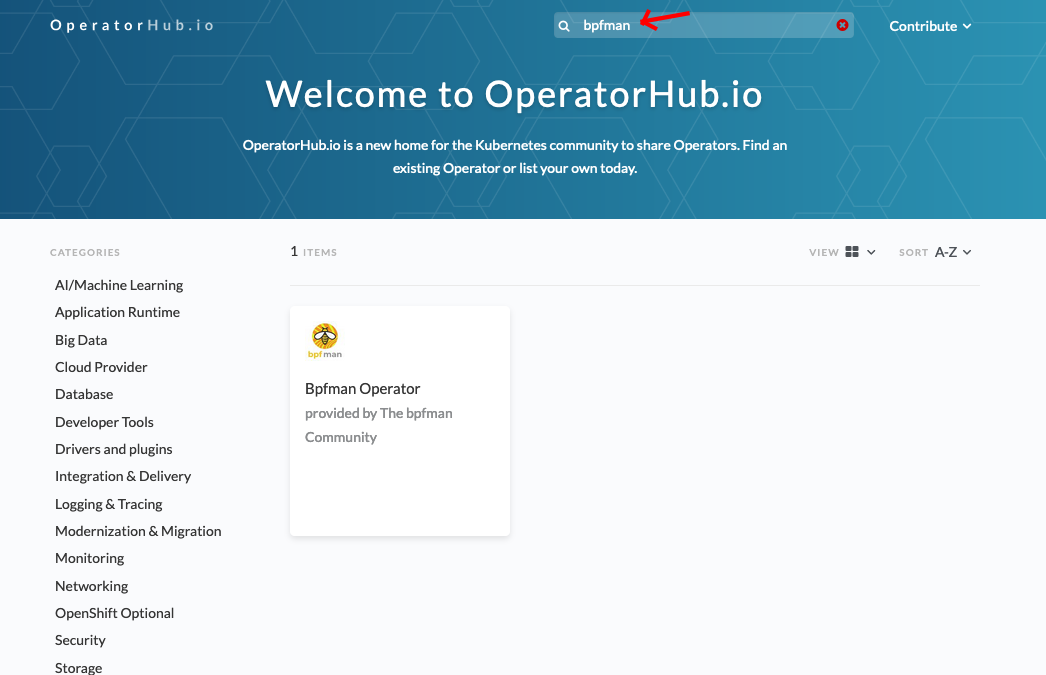
Click on the bpfman Operator, which will take you to the installation screen:
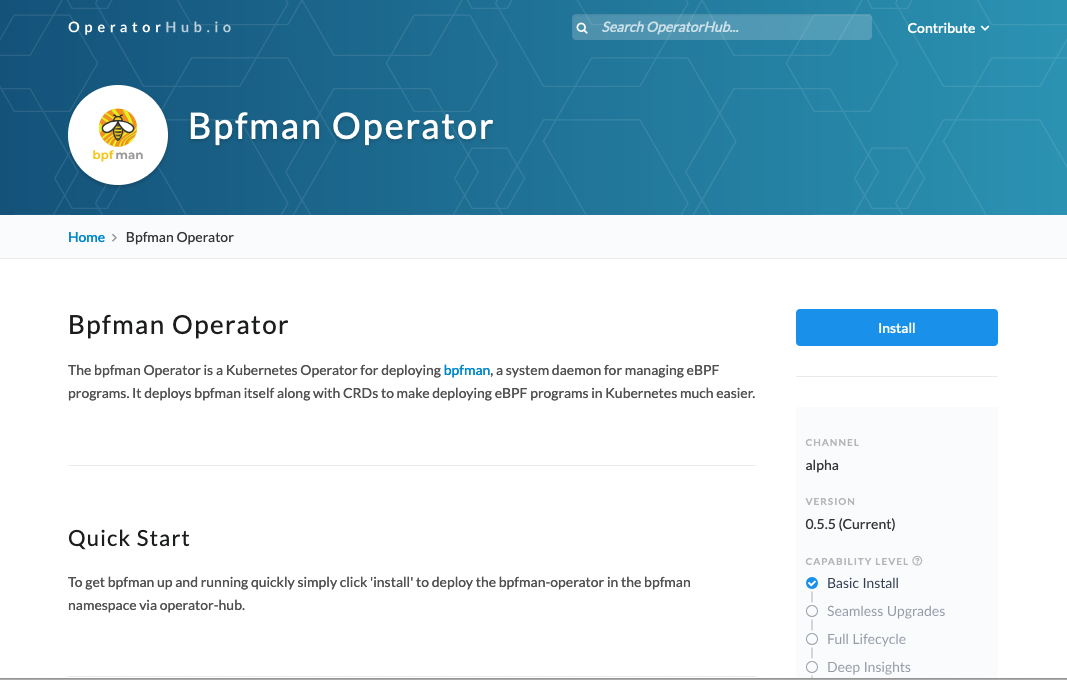
Click on the Install button, which will take you to the installation instructions, which are a set
of commands to run to install the bpfman Operator:
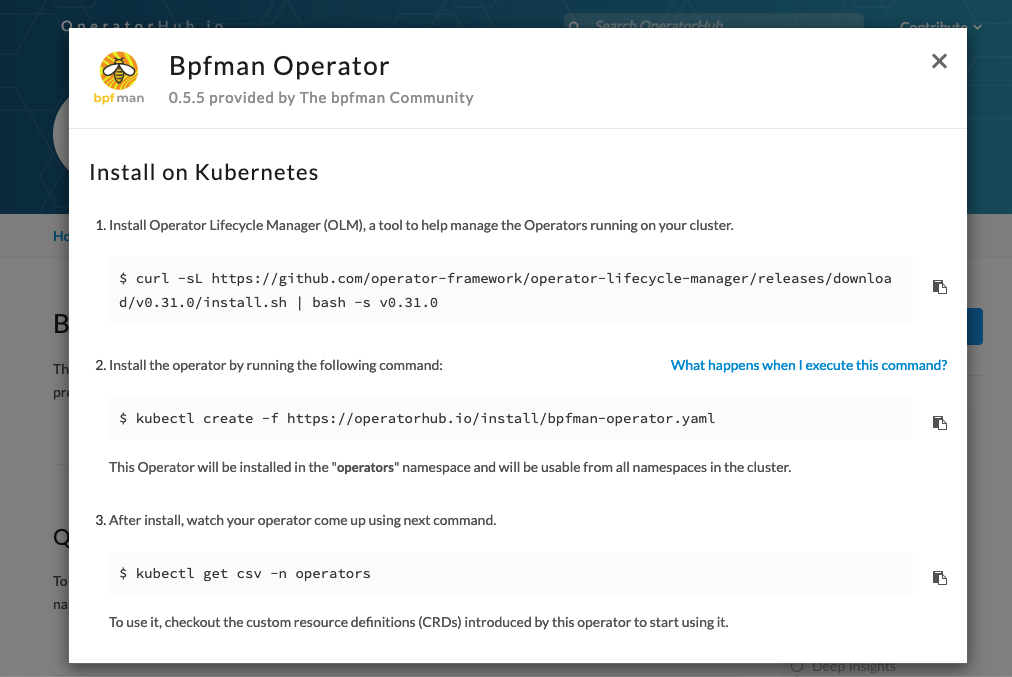
OperatorHub via OpenShift Console
To install from the OpenShift Console, from within the OpenShift Console, find OperatorHub, which
is under Operators on the left hand side of the page.
Then search for bpfman:
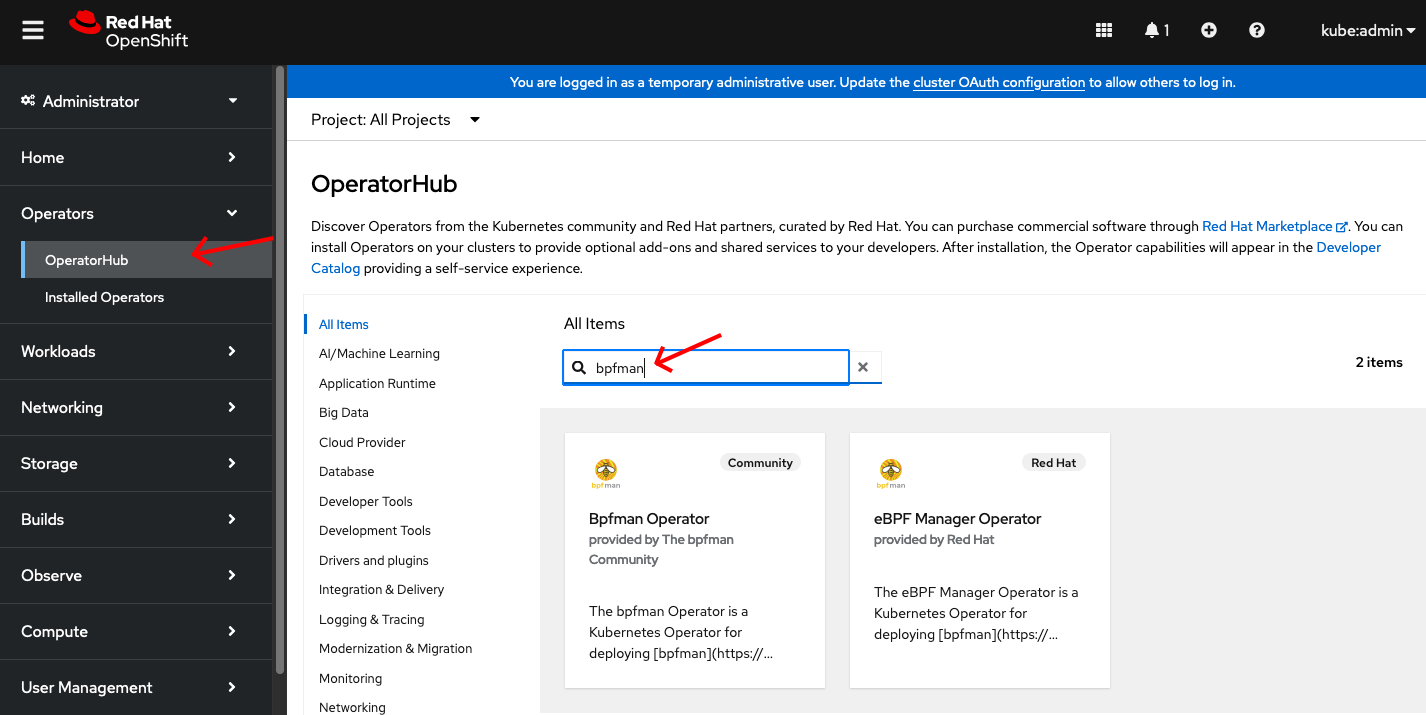
There should be two options, Community and Red Hat.
The Community based Operator tracks the releases from this repository.
The Red Hat based Operator is the downstream version from this repository and releases
with each OpenShift release.
Click on the operator to be installed:
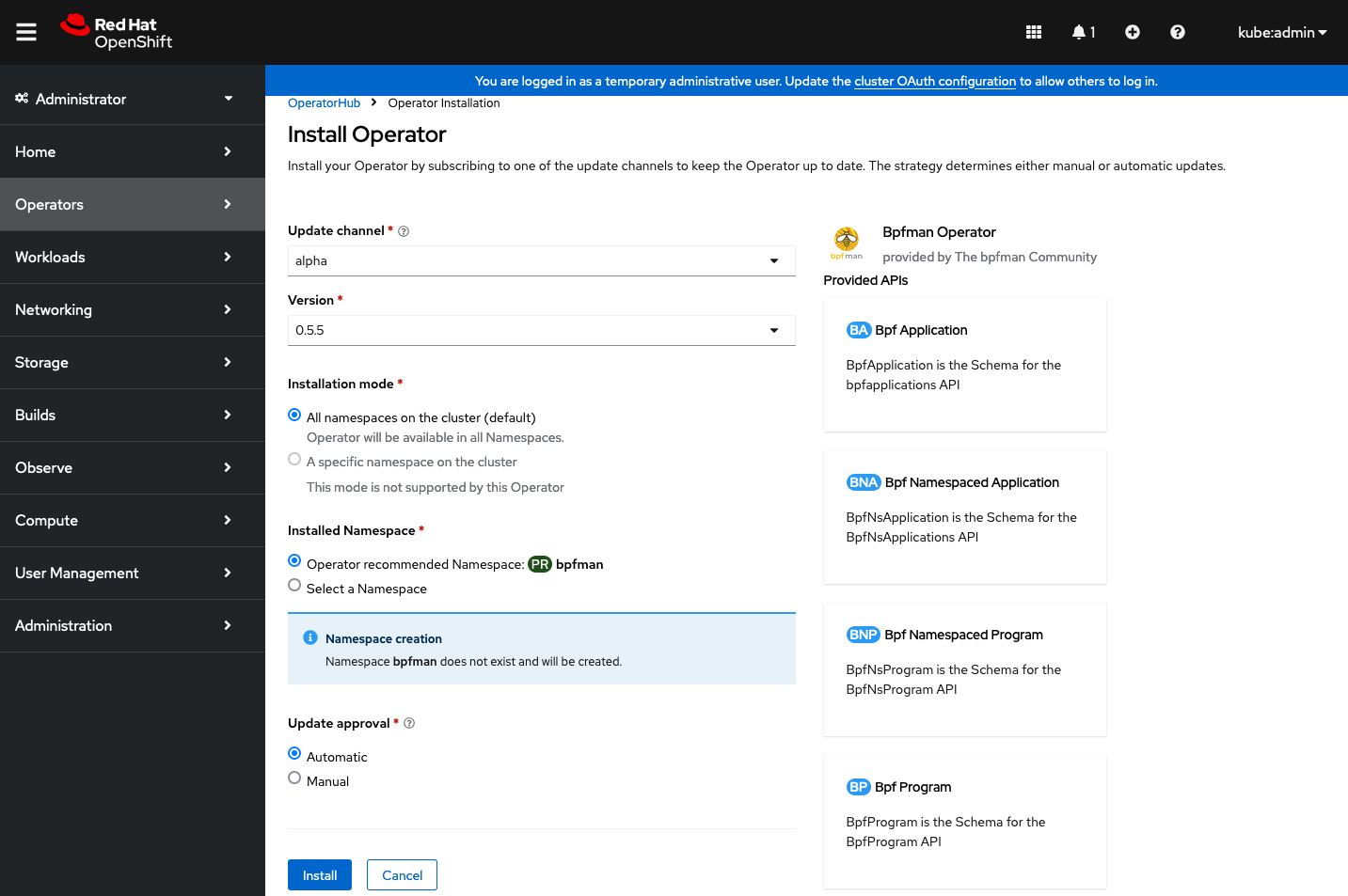
This provides the details on the operator.
Select the desired Version and click the Install button.
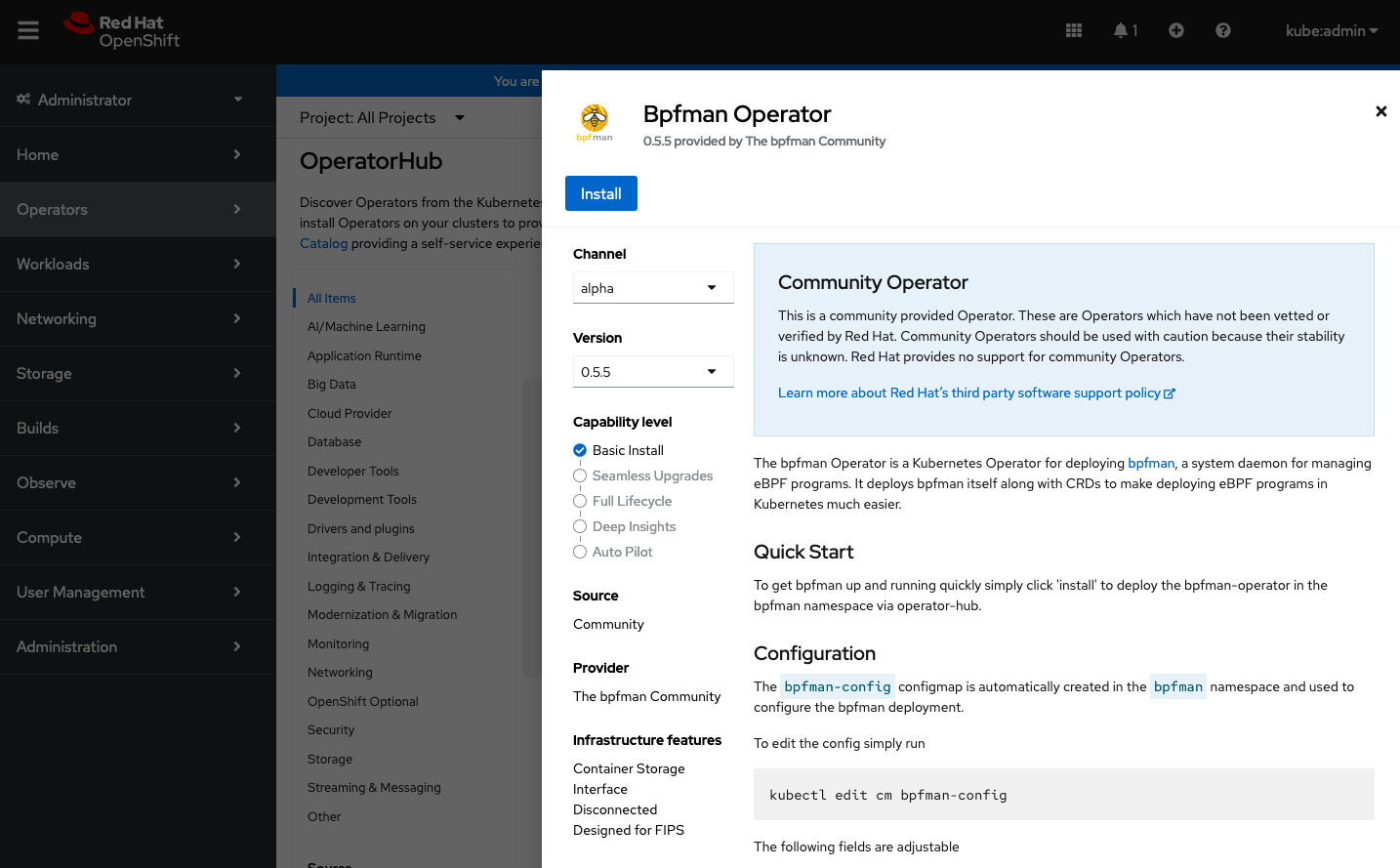
This provides similar details on the operator in a popup window.
Select the desired Version and click the Install button.
This will install the bpfman Operator on the cluster.
Custom OpenShift Console OperatorHub Bundle
If developing in bpfman/bpfman-operator and a custom image needs to be loaded from OpenShift Console OperatorHub, then make the changes to bpfman/bpfman-operator. Once the changes compile and are ready to be tested, build and push the container images:
cd bpfman-operator/
# Optionally include BPFMAN_IMG if trying to load private bpfman image
BPFMAN_IMG=quay.io/$QUAY_USER/bpfman:test \
BPFMAN_AGENT_IMG=quay.io/$QUAY_USER/bpfman-agent:test \
BPFMAN_OPERATOR_IMG=quay.io/$QUAY_USER/bpfman-operator:test \
make build-images
BPFMAN_AGENT_IMG=quay.io/$QUAY_USER/bpfman-agent:test \
BPFMAN_OPERATOR_IMG=quay.io/$QUAY_USER/bpfman-operator:test \
make push-images
Next, a bundle and catalog needs to be built and pushed:
BPFMAN_IMG=quay.io/$QUAY_USER/bpfman:test \
BPFMAN_AGENT_IMG=quay.io/$QUAY_USER/bpfman-agent:test \
BPFMAN_OPERATOR_IMG=quay.io/$QUAY_USER/bpfman-operator:test \
BUNDLE_IMG=quay.io/$QUAY_USER/bpfman-operator-bundle:development \
make bundle bundle-build bundle-push
CATALOG_IMG=quay.io/$QUAY_USER/bpfman-operator-catalog:development \
make catalog-build catalog-push
Once the bundle and catalog are built, make sure the cluster is up and running and specified in ~/.kube/config file. Then deploy the catalog:
Now the new catalog should show up in the OperatorHub (may have to refresh or restart the search
if OperatorHub was already up).
An additional option should be presented, Bpfman Operator development.
This can be now be installed as described above.
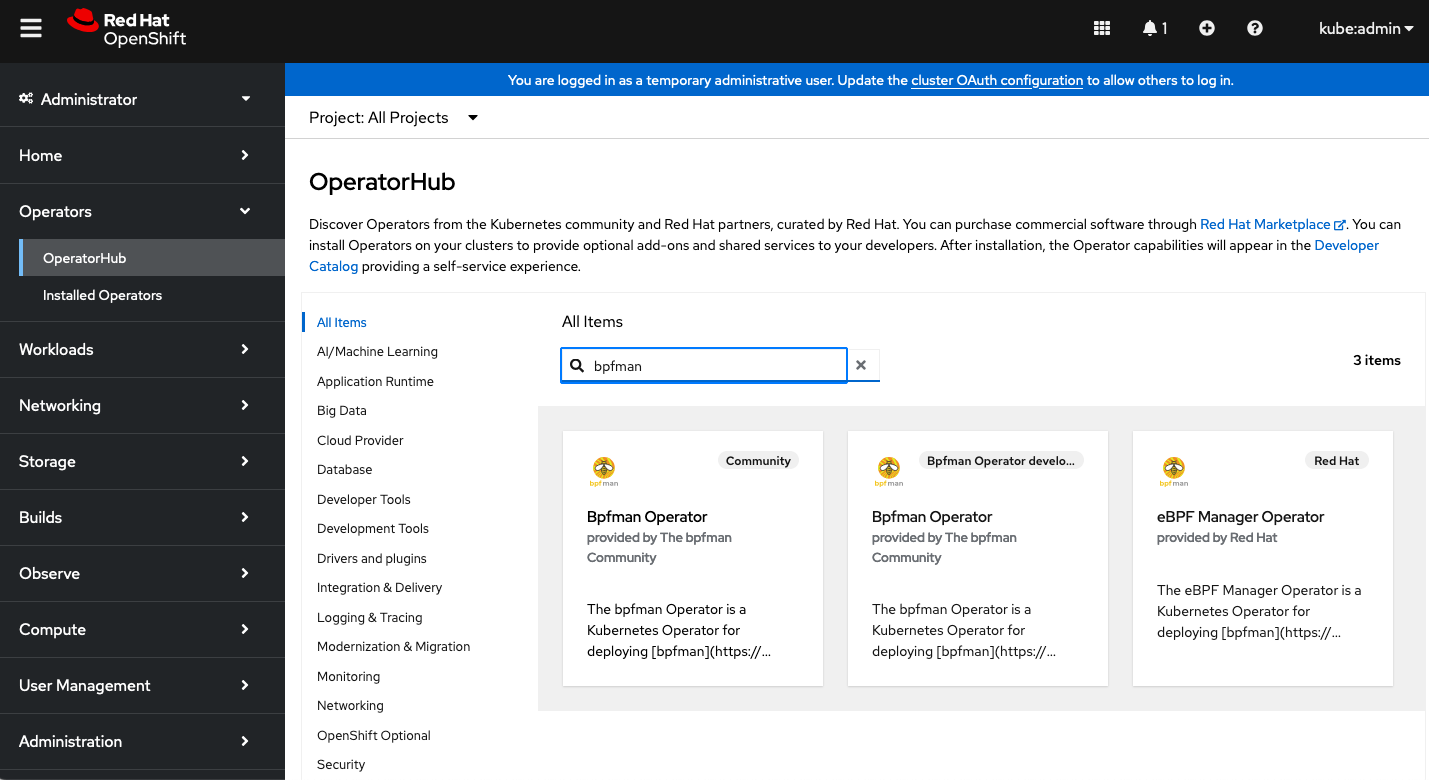
To clean up at a later time, execute:
Manually with Kustomize
To manually install with Kustomize and raw manifests, execute the following commands. The Openshift cluster needs to be up and running and specified in ~/.kube/config file.
To clean up at a later time, run:
Manually with OLM Bundle
The other option for installing the bpfman-operator is to install it using OLM bundle.
First setup the namespace and certificates for the operator with:
Then use operator-sdk to install the bundle like so:
./bin/operator-sdk run bundle quay.io/bpfman/bpfman-operator-bundle:latest --namespace openshift-bpfman
To clean up at a later time, run:
Verify the Installation
Regardless of the deployment method, if the bpfman-operator was deployed successfully,
you will see the bpfman-daemon and bpfman-operator pods running without errors:
kubectl get pods -n bpfman
NAME READY STATUS RESTARTS AGE
bpfman-daemon-w24pr 3/3 Running 0 130m
bpfman-operator-78cf9c44c6-rv7f2 2/2 Running 0 132m
For further verification, load a sample eBPF Program onto the cluster using Deploy an eBPF Program to the cluster.
bpfman-agent Profiling
bpfman-agent process use port 6060 for Golang profiling to be able to get the different profiles.
-
Set port-forward rule in a different terminal:
-
Download the required profiles:
curl -o <profile> http://localhost:6060/debug/pprof/<profile>Where
can be: profile description allocs A sampling of all memory allocations block Stack traces that led to blocking on synchronization primitives cmdline The command line invocation of the current program goroutine Stack traces of all current goroutines heap A sampling of memory allocations of live objects. You can specify the gc GET parameter to run GC before taking the heap sample. mutex Stack traces of holders of contended mutexes profile CPU profile. You can specify the duration in the seconds GET parameter. threadcreate Stack traces that led to the creation of new OS threads trace A trace of execution of the current program. You can specify the duration in the seconds GET parameter. Example:
curl "http://localhost:6060/debug/pprof/trace?seconds=20" -o trace curl "http://localhost:6060/debug/pprof/profile?duration=20" -o cpu curl "http://localhost:6060/debug/pprof/heap?gc" -o heap curl "http://localhost:6060/debug/pprof/allocs" -o allocs curl "http://localhost:6060/debug/pprof/goroutine" -o goroutine -
Use go tool pprof to dig into the profiles (go tool trace for the trace profile) or use web interface. For example:
Troubleshooting
Metrics/Health port issues
In some scenarios, the health and metric ports may are already in use by other services on the system. When this happens the bpfman-agent container fails to deploy. The ports currently default to 8175 and 8174.
The ports are passed in through the daemonset.yaml for the bpfman-daemon and deployment.yaml and
manager_auth_proxy_patch.yaml for the bpfman-operator.
The easiest way to change which ports are used is to update these yaml files and rebuild the container images.
The container images need to be rebuilt because the bpfman-daemon is deployed from the bpfman-operator
and the associated yaml files are copied into the bpfman-operator image.
If rebuild the container images is not desirable, then the ports can be changed on the fly.
For the bpfman-operator, the ports can be updated by editing the bpfman-operator Deployment.
kubectl edit deployment -n bpfman bpfman-operator
apiVersion: apps/v1
kind: Deployment
:
spec:
template:
:
spec:
containers:
-args:
- --secure-listen-address=0.0.0.0:8443
- --upstream=http://127.0.0.1:8174/ <-- UPDATE
- --logtostderr=true
- --v=0
name: kube-rbac-proxy
:
- args:
- --health-probe-bind-address=:8175 <-- UPDATE
- --metrics-bind-address=127.0.0.1:8174 <-- UPDATE
- --leader-elect
:
livenessProbe:
failureThreshold: 3
httpGet:
path: /healthz
port: 8175 <-- UPDATE
scheme: HTTP
:
name: bpfman-operator
readinessProbe:
failureThreshold: 3
httpGet:
path: /readyz
port: 8175 <-- UPDATE
scheme: HTTP
:
For the bpfman-daemon, the ports could be updated by editing the bpfman-daemon DaemonSet.
However, if bpfman-daemon is restarted for any reason by the bpfman-operator, the changes
will be lost. So it is recommended to update the ports for the bpfman-daemon via the bpfman
bpfman-config ConfigMap.
kubectl edit configmap -n bpfman bpfman-config
apiVersion: v1
data:
bpfman.agent.healthprobe.addr: :8175 <-- UPDATE
bpfman.agent.image: quay.io/bpfman/bpfman-agent:latest
bpfman.agent.log.level: info
bpfman.agent.metric.addr: 127.0.0.1:8174 <-- UPDATE
bpfman.image: quay.io/bpfman/bpfman:latest
bpfman.log.level: debug
kind: ConfigMap
: